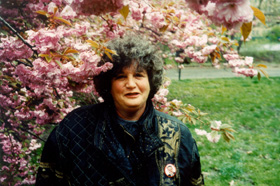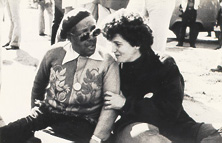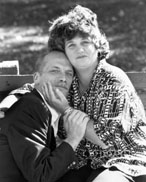from A Fragile Union (1998)
 Introduction
Introduction
-
There is no guarantee that the flowers I have chosen would flatter the eye when assembled. Besides there are others I can’t call to mind. But there’s no hurry. I shall dig them all into their storage trenches, some in my memory, the others in my imagination. There, they can still find the humus, the slightly bitter water, the warmth and the gratitude which will perhaps keep them from dying.
- Colette
With this book, I offer you the fragile unions that are my life—the life of a fifty-eight-year-old white Jewish fem lesbian woman with cancer living in New York City in the United States of America at the end of the twentieth century. I give you these details not as markers of identity the way we often did in the lesbian-feminist movement of the 1970s and ’80s, thinking that if we laid out our particulars, we had cleared away all ambiguity about our lives, but precisely for the opposite reason. Each of the listed elements represents huge worlds of shifting meaning, unending searches for what can keep my love and what has to be let go. Nothing feels certain to me now, other than the precariousness of my understandings and my continued need to touch. But contrary to what some have said about this legacy of doubt, I find this to be a time of great passion in my life, a time of increased commitments to the forging of fragile solidarities that, if of the body, may last only a night, and if of a more sweeping kind, carry me more humbly than ever into historical processes.
My writing grows out of desperate quandaries—both personal and national. How to love when I keep failing, how to be brave when I am so fearful, how to protest injustices when I am so tired, how to embrace difference when I do not even trust myself? I am still haunted by the Reagan years, when I was so aware of the fragility of the social world around me, when I saw a country so marked by arrogance, so assaulted by national malice that I turned to my other America, one in which to be poor was not a crime and one that recognized that economic ambition without a compassionate social vision was a form of national cruelty. I found this other country in the lives of my open-entrollment students in the Queens College SEEK Program, in my lesbian-queer community, and in my own immediate world of sex and desire. In all these places I saw how fragile hope was and yet how tenaciously it survived in the lives of those who lived below the gaze of national power. In Reagan’s America and still in this one, we run the risk of drowning in one another’s histories. When opportunities are callously diminished and the distance between those who have more than they need and those who have less grows into a class divide so wide that whole generations, in despair, plunge into it, how can we find a way back to honor one another’s stories?

In my twenty-five-year history with the Lesbian Herstory Archives, I set myself the goal of commemorating the differences among lives in the hope of finding shared grounds of tenacity and tenderness. It was my search for documents of connection that inspired several essays in this collection. I do not in any way think that my friendship with Mabel Hampton, an eighty-three-year-old African American lesbian woman, mitigated the racial and economic injustices this country doled out to her, but in presenting the words of her life, I hope I have preserved for others the gift of her self-awareness and her recognition of the life-giving power of multiple communities of sustenance. The essay “My Fem Quest” grows out of an intergenerational conversation with Barbara Cruikshank, an astute young woman who experiences her desires with a different set of questions than my 1950s-created fem self ever thought to ask. I have been gifted in my later life with the friendship of several younger women whose minds glow with the challenge of deconstructing ideas into which their lives no longer fit. These friendships are fragile unions of a very special kind. I carry my past rather heavy-handedly, but these young women understand where my need for certainty comes from, while I try to ground their longings in possibilities of meaning that I have come to trust. Finally, in my writing about John Preston, my co-editor of Sister and Brother: Lesbians and Gay Men Write About Their Lives Together and comrade in the writing of what some call pornography, I offer the portrait of a friendship based on a mutual respect for the difficult task of erotic writing. John died of AIDS before our collaborative work was finished, but he educated me about the generosity of friends who are writers, even when they are under the deadliest of sieges.
 John, in his last months, in 1994, would call me late at night to make sure I understood what final touches our book still needed and to tell me of his struggle to preserve the John Preston he had worked so hard to create: the strong, direct master of other men’s erotic fantasies. What John and I did not know at that time was that I, too, was harboring a cellular battle for life that would change my days. In 1995, I was diagnosed with advanced colon cancer. Fragility now defines my body in a more profound way than ever before. The cellular surge of cancer and the late-twentieth-century medical answer of poisoning all to kill some is a permanent discourse within my skin. In some way I must work out a collaboration with the energy of this disease. Cancer cells want to be immortal—they are lovers of their own life—but for me to live, they must die. This is the crack at the center now, the primary fissure that I must find a way to allow to exist within me. Like John, I use writing about the body and my need for touch as a way to negotiate my terror and to honor life.
John, in his last months, in 1994, would call me late at night to make sure I understood what final touches our book still needed and to tell me of his struggle to preserve the John Preston he had worked so hard to create: the strong, direct master of other men’s erotic fantasies. What John and I did not know at that time was that I, too, was harboring a cellular battle for life that would change my days. In 1995, I was diagnosed with advanced colon cancer. Fragility now defines my body in a more profound way than ever before. The cellular surge of cancer and the late-twentieth-century medical answer of poisoning all to kill some is a permanent discourse within my skin. In some way I must work out a collaboration with the energy of this disease. Cancer cells want to be immortal—they are lovers of their own life—but for me to live, they must die. This is the crack at the center now, the primary fissure that I must find a way to allow to exist within me. Like John, I use writing about the body and my need for touch as a way to negotiate my terror and to honor life.
In the ten years encompassed by the writings in this book, I have participated in my queer communities’ struggle for political, legal, and social respect. This has taken me from protests in the street over the exclusion of gay people from New York’s St. Patrick’s Day parade to speaking about the history of lesbian sexuality at the SUNY, New Paltz, conference on women’s sexuality. In so doing, I have been reminded of the strange position gay people and lesbians now find themselves in. National messages concerning our right to a public life are contradictory: Ellen can be a TV lesbian for six months, but like a pornographic novel, she comes with a warning; gay women and men can serve in the armed forces as long as they are silent about their love while they are being trained to kill; women talking about specific sexual practices on a college campus are called “unnnatural” by a Wall Street Journal columnist because they dare to separate sexuality from reproduction. At a time like this, cultural exchanges become a marketplace for cultural betrayals.
We live in a society that still debates almost every aspect of our lives in the daily newspapers. There, we learn which religion has decided not to allow gay marriages, which right-wing candidate has most forcefully announced that no gay person will ever serve in his administration, which state has voted to repeal its law prohibiting discrimination against gay people. These are only the most obvious examples of the problem we pose for this society. Violence against transgendered and transsexual people remains the invisible crime it always has been in this country. Many current national cultural discussions are coded angers at our presence—the rage at “postmodern” changes in the college curriculum has homophobia as one of its unspoken driving forces. Look was has happened since we let queer theory into the gates of academia—that is the subtext of repeated articles bemoaning the decadent state of late-twentieth-century literary and cultural discussions. Now, leading academic historians who once knew better are urging us to bring history back onto the professional fold, away from the people who suffer its consequences. In the 1980s it was grassroots lesbian and gay scholars who showed the potential for new sources of historical knowledge and more egalitarian ways of sharing the resulting insights. In the battle over funding for the arts, we have seen a nation willing to dismantle its program of support rather than signal its acceptance of the gay imagination.
I have been lucky enough in my own life to have participated in the beginning moments of a people’s movement from private history to public discourse. I remember the early meetings in Boston, Manhattan, Maine, San Francisco, and Toronto, where a handful of men and women gathered to share their discoveries and to agonize over how to find the money to continue their work, how best to share these discoveries with the communities they were documenting, and how to balance the need for anonymity—a survival tactic of our people for so long—against the delight of revelation. I remember the flickering slide shows, capturing the lost faces and communal streets of other gay times, and the stunned recognition of audiences who were meeting for the first time with their own public story. In those days, we were not always sure that this fledgling idea of lesbian and gay history would find a home in the world, and after it did, after a few years of students learning about how large communities of lesbian women lived a different American history or how American culture was influenced by a gay sensibility or how world literature is marked by the experience of same-sex love, many academicians and politicans are now decrying this “trivializing” of learning. The gay community has always been at the mercy of other people’s ideas about us, whether they were medical, legal, or religious. But we will not go back into an intellectual closet. Ideas belong to no one kind of people, and while they have the power to both enslave and liberate, they are also fragile expressions of hope, hope that the most maligned can articulate their own pasts and envision their own futures.
Because I entered the culturally policed queer community in the 1950s, my sense of the history of this struggle for liberation is long and deep; my writing is in the service of a political and cultural struggle—I am proud of that—but the other part of this admission is the responsibility I feel to create no new prisons while I try to dismantle old ones. Some of the writing in this book is a rereading of my own texts, in which I share with my readers what I now feel I got wrong the first time around; in some cases, I am not sure what the problem in my thinking is, but I now there is one. Because I am lucky enough to have been an active participant in forty years of both national and communal struggles for change, I know the richness of multiple visions. I call my writings offerings because that is what they are: pieces of understanding or of questions, moments of intense pleasure or body-breaking pain—moments that you honor with your hearing. These offerings are as fragile as the body that lived them, my body, like yours.
Finally, this is a book marked by leave-takings. The end of a ten-year relationship, a mundane pain in the world, but one that bent my words. The farewell to friends whose love and energy of purpose made my life glow. To my intimate daily contact with the Lesbian Herstory Archives, which after twenty years moved into its new home in a different borough, a home it desperately needed but whose absence I feel every day when I reach for the photograph or article or book that no longer greets me every morning and feel the emptiness of an apartment that no longer brims with the wonder of thousands of visitors bringing their projects and dreams to my dining-room table. To my students, fragile in their youth but strong in their determination to forge new histories, who for twenty-nine years brought their words to me and who for a little while shared their cultural journeys with me in all their richness and complexity, in all their yearnings for safety and all their undertakings of risk.
But the wonder of life is change. My new publishers, Felice Newman and Frédérique Delacoste of Cleis Press, have given me the chance to write my own words again. Dianne Otto, a new friend and lover from Melbourne, Australia, has brought me a fuller understanding of love between women and an entryway into the world beyond my own country. I thank her for her attentive reading of my words and her willingness to take time from her own work to better inform mine. And to Lee Hudson, with whom I shared so much of the past, I look to the time when our strengths will reunite us.
I have experienced three sublimely beautiful things in my life, and each has been judged unacceptable by large parts of this society: the taste and touch of women lovers, the wondrous feeling of being part of a people working to free themselves, and for almost thirty years, the trust and attention of students many others did not want to teach. In my bed, in the streets of political protest, and in the classroom, I felt the possibilities of life most keenly, I saw the wonder of human hope and creativity most clearly. My students’ heads bowed in concentration as they struggled to write for themselves and for me, my lover’s head thrown back as she awaited the pressure of my tongue, my comrades’ cold breath in the air as they stood their ground—these gifts, either so judged or dismissed, so problematical for some when put in the same sentence, cannot be isolated from one another. Made of fragile human dreams, but also of fierce desire, they have bound my life with joy.
New York City
July 1998
Return to the Foyer


